Geoscience Projects and The Online Evaluation Resource Library (OERL) - PowerPoint PPT Presentation
Title:
Geoscience Projects and The Online Evaluation Resource Library (OERL)
Description:
: Online Evaluation Resource Library Geoscience Projects and The Online Evaluation Resource Library (OERL) Daniel R. Zalles, Ph.D SRI International – PowerPoint PPT presentation
Number of Views:117
Avg rating:3.0/5.0
Title: Geoscience Projects and The Online Evaluation Resource Library (OERL)
1
Geoscience Projects and The Online Evaluation
Resource Library (OERL)
Daniel R. Zalles, Ph.D SRI International
Funded by the Research, Evaluation, and
Communication (REC) Division of the National
Science Foundation Conrad Katzenmeyer, Program
Officer
2
A Web-Based Tool to Support the Professional
Development of Evaluators
3
Reviewed collection of plans, instruments, and
reports, complete or excerpted
4
Reviewed collection of plans, instruments, and
reports, complete or excerpted
5
Reviewed collection of plans, instruments, and
reports, complete or excerpted
6
Submission Process
- NSF solicits from targeted project areas
- SRI reviews and catalogs
- Current and pending solicitations
- Advanced Technology Education
- Course, Curriculum, and Laboratory Improvement
- Programs for Gender Equity
7
Current Representation of Geoscience Projects in
OERL
8
Plan Excerpts Integrated Math-Physics Project
9
Curriculum Evaluation Instrument
10
Student Assessment Instrument
11
Professional Development Follow-Up Instrument
12
Report Excerpts Environmental Science Teacher
Education Project
13
Complete Report Professional Development for
Physics Instructors
14
Alignment Table Example Glossary, Quality
Criteria, Standards
15
Alignment Table with Pop-Up Definitions
16
Professional Development Module on Methodological
Approach and Sampling Step by Step Introduction
to the Strategy
17
Professional Development Module on Methodological
Approach and Sampling Details about Step 1 of
the Strategy
18
Professional Development Module on Methodological
Approach and Sampling Introduction to the
Scenario (model application of strategy)
19
Professional Development Module on Methodological
Approach and Sampling Introduction to Case Study
20
Professional Development Module on Methodological
Approach and Sampling Interactive Exercise in
Case Study
21
Professional Development Module on Methodological
Approach and Sampling Feedback on Case Study
User Response
22
Evaluation Design Strategies
METHODOLOGY Identify the project's assumptions
about change. Decide how much you should be
looking at implementation and how much at
outcomes. Determine what types of data to
collect, and who to collect it from. If examining
outcomes, determine where the desired outcomes
fit on a proximal-to-distal continuum and how the
evaluation will address them. Decide what, if
any, comparison outcome data will be collected.
23
Evaluation Design Strategies Links to the
Collection
Link phrase assumptions about change 1. briefly
describes project goals and how the evaluation
was designed to see if they were met (click to
see report) 2. describes what the evaluators
expected to find as an indirect result of the
intervention (click to see report) 3. states the
theories of change that were behind the
intervention (click to see report)
24
Evaluation Design Strategies (cont.)
SAMPLING Determine if data should be collected
from an entire population or from a sample. If
sampling, randomly select the sample from the
population. Identify which attributes need
special attention in the design, and determine
how they should be attended to in the sampling
process to avoid bias. Minimize the effects of
other sources of bias besides sampling
bias. Determine the optimal sample size. Maximize
the efficiency of your sample.
25
Questionnaire Strategies - Appropriateness
1. Identify the goals and broad questions that
underly of your evaluation 2. Identify the groups
from which you need to get information 3. Justify
the use of a questionnaire in the evaluation.
Condition A You must be able to say yes to one
or more of these questions about the
population. - Does it have opinions on
the issues that interest you? - Is it
qualified to give you facts or informed judgments
on the issues? Is it the best or sole source of
background information about itself (e.g., of
background information that is either not
available or not as desirable from alternative
sources, such as test scores or other
records) Condition B You must have a clear idea
of what variables you want to gather data about,
and you need to be reasonably sure you will get
that data by posing the same (e.g., standardized)
questions. Condition C You must believe that the
respondents can be relied on to give you the
information you need, perhaps with incentives.
This means that they will be proficient enough in
the language to comprehend the questions and
repond properly, truthful, and motivated enough
to complete the questionnaire and respond
carefully
26
Questionnaire Strategies (cont.) Writing
Questions
Generate a list of purposes for your questions
that address your evaluation goals. Compose first
drafts of the questions that correspond to your
list of goals, and identify what they are
supposed to indicate about the phenomena being
investigated. Determine whether each question
should be open response or closed
response. Tailor closed response questions to
provide maximum benefit. Word all questions
clearly so that respondents understand what you
are trying to learn from them.































